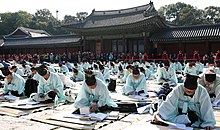
Back غواغو Arabic Gwageo Spanish Kwagŏ French Gwageo ID 朝鮮の科挙 Japanese 과거 제도#한국의 과거 Korean Gwageo Malay Gwageo Portuguese Gwageo Romanian Кваго Russian
| Gwageo | |
 A modern reenactment of the gwageo being administered (2018) | |
| Korean name | |
|---|---|
| Hangul | 과거 |
| Hanja | 科擧 |
| Revised Romanization | gwageo |
| McCune–Reischauer | kwagŏ |
The gwageo (Korean: 과거) or kwagŏ were the national civil service examinations under the Goryeo (918–1392) and Joseon (1392–1897) periods of Korea. Typically quite demanding, these tests measured candidates' ability of writing composition and knowledge of the Chinese classics. The form of writing varied from literature to proposals on management of the state. Technical subjects were also tested to appoint experts on medicine, interpretation, accounting, law etc. These were the primary route for most people to achieve positions in the bureaucracy.
Based on the civil service examinations of imperial China, the gwageo first arose in Unified Silla, gained importance in Goryeo, and were the centerpiece of most education in the Joseon dynasty. The tutelage provided at the hyanggyo, seowon, and Sungkyunkwan was aimed primarily at preparing students for the gwageo and their subsequent career in government service. Under Joseon law, high office was closed to those who were not children of officials of the second full rank or higher, unless the candidate had passed the gwageo. Those who passed the higher literary examination came to monopolize all of the dynasty's high positions of state.[1]
- ^ SNUERI 1997, p. 108.
© MMXXIII Rich X Search. We shall prevail. All rights reserved. Rich X Search